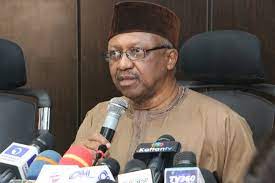By Hassan Zaggi
The Minister of Health, Osagie Ehenire, has disclosed that Nigeria is currently mapping out strategies to ensure that it is prepared to face any form of epidemic in the future.
The Minister made the disclosure at a media briefing in Abuja, Monday, vowing that Nigeria will not allow itself to be taken unawares the way it found itself during the COVID-19 outbreak.
He, however, noted that Nigeria is not in a hurry to produce the COVID-19 vaccine because, according to him, the world now has many COVID-19 vaccines.
The Minister further disclosed that the federal government recently procured over 30 million doses of the COVID-19 vaccines added with the ones that were donated by other countries.
According to Ehanire, the country is ready to begin the manufacture of the 15 per cent of routine vaccines needed in the country.
“There is an initiative of the federal government working with the private sector already existing to produce the so-called routine vaccines.
“Normally vaccines for Expanded Programme on Immunization (EPI) were already on the pipeline. That one is running on its own and they are to start by producing 15 per cent of routine vaccines.
“Nigeria is among those countries that were granted the right to have the technology to produce COVID-19 vaccine which is being handled by Bio-vaccine Limited with support from Federal Ministry of Health.
“Another consortium (group of companies) came to make a presentation to the president about vaccine production and the Federal Ministry of Health engaged that consortium and it is about that consortium that the report to the presidency was due which has been done.
“But generally, the world now has plenty of vaccines of COVID-19 which are being donated to Nigeria,” the Minister said.
He explained that: “The Federal Government also ordered for over 30 million doses of the vaccines, but even the vaccines which we ordered which the federal government is paying for were not being used yet because we are using donations from other countries.
“So the urgency to produce our own COVID-19 vaccine now is a bit reduced because we have donations and we have the ones that the government has procured.”
On what the government is doing to ensure that Nigeria is prepared locally to combat any form of epidemic in the future, the Minister said: “But the urgency to have technology to know how to produce vaccine is what is pressing.
“And so, we are bringing together all our experts including the producers and manufacturers of vaccines to find a way to have the technology in case of any future outbreaks to produce vaccine to join in research and innovation.
“We are bringing together all our research capacities and assets to have that knowledge and that skill and the technology for indigenous domestic vaccine production in case of any other such attack.
“The technical working group needs to pursue that avenue of research and development because the rest of the world agreed that anytime in the future there can be that Disease X, that is the disease that we do not know about.
“It may be like COVID or something else, but what is clear is that there will be need for vaccine.
“There is research going on in many countries trying to find out that vaccine. Nigeria wants to be part of that research and development efforts.
“We must have the assets, the technology and knowledge and all that the country needs to be able to join the rest of the world in finding the answers so that if Nigeria finds the answer first, we can also support the rest of the world in getting access to the vaccines.”
Speaking on efforts by the federal government to ensure sickle cell patients get help, Dr. Salma Anas Kolo, disclosed that Nigeria which has half of the global burden of Sickle cell is working hard to ensure those affected live without pain.
According to her, no country in the world that has invested in sickle cell like Nigeria in areas like advocacy and awareness creation.
This, she said, led to the development of a herbal remedy by the Nigeria Institute for Pharmaceutical Research and Development (NIPRD) called NIPRISAN.
“This shows the importance the government attached to the fight against sickle cell across the spectrum of prevention, provision of counselling services, enhancing access to prompt diagnosis and treatment of those affected by the disease.
“Also, in partnership with CSOs, the private sector and other government parastatal, the National Assembly passed a bill in 2021 on all the issues around prevention and strengthening of health system to be able to provide quality services to the children that are already affected by sickle cell and ensuring that they live normal life and in addition to guidelines that have been develop.
“The federal government has also decentralized the campaign to subnational levels, hence, every state and local government have the responsibility to commemorate the sickle cell day.”



